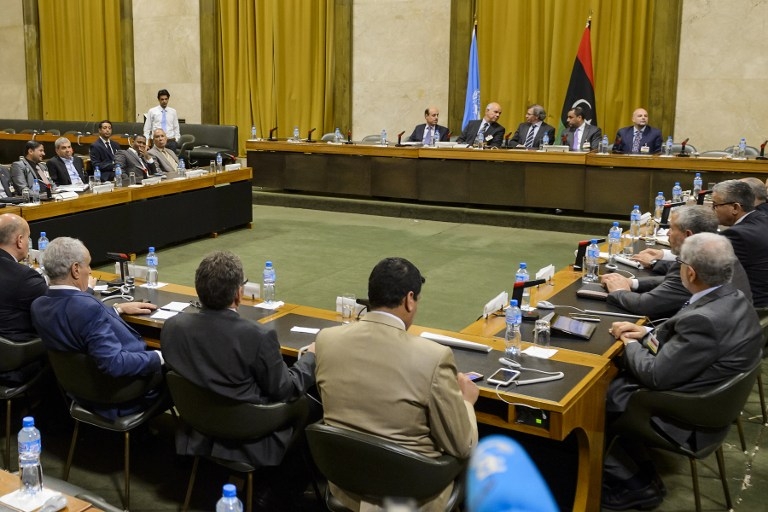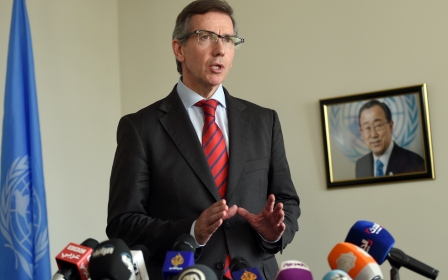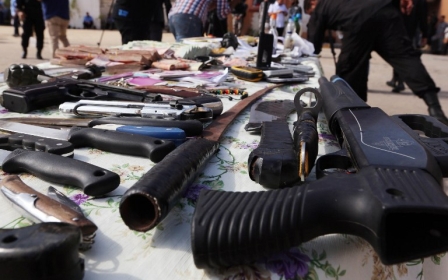Liberate Libya from the UN

Libya is a land of superlatives: Africa’s greatest oil reserves, the world’s highest recorded temperature, the present global leader in both migrant trafficking drownings and the proliferation of heavy arms, the world’s most traffic fatalities per capita, and the only country in history to have a multi-polar civil war in which all warring factions receive salaries from the same institution - the Libyan Central Bank.
Adding to this sordid list, the past two weeks have just earned the country a new dubious distinction – global scandal epicentre. It is perhaps fitting, therefore, that the Libyan embassy in Washington, DC is located in the Watergate building.
Although Western audiences are still likely to be more familiar with "Benghazi" and Hillary Clinton’s Libya emails, a far more nefarious Libya-related scandal has recently broken. The UN Special Envoy to Libya, Bernardino Leon, a former Spanish socialist politician, has opted to take a high-paying job in the UAE as the head of the Emirate's diplomatic academy after his term as envoy expires.
This manifest impropriety - working for a prime supporter of one of the main factions in the Libya civil war - is only the tip of scandal. Leon’s leaked emails released by the Guardian and Middle East Eye show an even more perverse tale: he coordinated his UN negotiation strategy with Emirati officials and their Libyan allies. In his own words, he sought to help the Emirates achieve their region-wide objective of defeating the Muslim Brotherhood and their Tripoli-based ally, the General National Congress, by delegitimising their representatives and by not according them an equal seat at the negotiating table alongside the pro-UAE House of Representatives.
As such, Leon successfully undermined good-faith efforts by the US, UK, France, and others to truly mediate between Libya’s multiple factions. His leaked emails brazenly show that he actively blocked attempts to host a peace conference convening the real stakeholders in the country - the various local, tribal and ideological militias - so as to prop up the unrepresentative political class favoured by his Emirati backers.
The exposition of Leon's subterfuge has finally sparked US Secretary of State John Kerry to demand such a conference at a recent meeting in Tunisia. And yet, the targeting of an air strike on Friday against the top Islamic State official in Libya, Abu Nabil al-Anbari, rather than working to build an anti-IS coalition, is a step in the wrong direction. Only a robust political response to the failure of the UN process can deal with the scale of the mess in Libya. Targeted assassinations against jihadists will not solve the political failures that gives IS a breeding ground and safe haven in Libya.
Modern-day Greek tragedy
Like many attention-grabbing 21st century scandals, Leon-gate involves bribes, terrorists, leaked emails and the shameless overreach of a once-popular and charismatic politician then catapulted to disgrace by his own hubris. By favouring one side of the Libyan conflict over the others, he has not only discredited the UN and himself; he has taught that politicians can be bribed and that millions can be made to suffer as an elite few squabble over the corrupt spoils at the top of the pyramid.
The fallout of the scandal is hitting Libya hard: the key pillars of the Libyan economy, the Libyan Central Bank and the National Oil Corporation, felt the first tremors of the scandal. The value of the Libyan dinar went into free-fall last week in informal currency exchanges, falling below 4 LYD per US$ before militias attacked informal commercial brokers and currency markets in Tripoli, shutting down the currency and gold quarter in the old city. Just as George W Bush’s Iraq adventure irreparably damaged US credibility in the Middle East, Leon-gate is likely to undermine perceived UN neutrality even more than the “Oil for Food” fiasco in Saddam’s Iraq.
A robust examination of Leon’s record is an even greater indictment. I have long noted that the international community has been biased towards Libya's internationally recognised House of Representative (HoR) and against its Tripoli-based rival.
This bias has appeared to derive from a range of mutually reinforcing factors: Western governments’ desire to deal with interlocutors who are educated in the West, their penchant for dealing with "armies" rather than "armed groups", with those who claim to be secular and fighting jihadists, and the momentum of bureaucratic institutions like the US State Department for meeting with officials who claim to have electoral legitimacy rather than those who actually represent their local communities.
These factors have long been at play in the Middle East and explain why the US and other countries have typically supported repressive anti-Islamist dictators such as Hosni Mubarak and Abdel Fattah al-Sisi in Egypt or Ali Abdullah Saleh in Yemen, while turning their backs on popular and viable Islamist-aligned regimes elsewhere. And yet, if all Leon-gate did was expose that the standard international best practice in the post-9/11 world has been to prop up repressive anti-Islamist dictators, it would not be news.
The real revelations of this scandal are how the anti-Islamist Libyan politicians and their international backers (UAE, Saudi Arabia and Egypt) possess the means and the leverage to corrupt Western policy formation from the inside.
In the case of Libya, the UAE/Egypt/HoR grouping has not been led by the Egyptians or Emiratis or even the HoR's foreign minister, but rather by an influential and well-connected cabal of Libyans based in the Emirates. Mahmoud Gibril – a US-educated former Libyan PM and virulent anti-Muslim Brotherhood politician – and Aref Nayed – a Sufi Scholar, businessman, and Libyan Ambassador to the UAE – have been playing Leon, their Emirati hosts, and the international community as dupes.
The UAE has been a serial violator of the arms embargo in Libya and has, with Egypt, been the major international player to intervene militarily in support of its clients in the multipolar civil war. This effort has been a direct attempt to prop up the Gibril/Nayed faction.
In short, Gibril and Nayed have manipulated Emirati support in a four-year-long audition to become Libyan versions of the recently deceased Ahmed Chalabi. And despite Chalabi being fully discredited as the “NeoConner” in 2008, Gibril and Nayed were able to maintain credibility in Western capitals because they gamed the system by leveraging their roles in the 2011 uprising and ensuring access to influential Western statesmen and to Abdullah bin Zayed al-Nahyan, the UAE’s foreign minister, who has essentially subcontracted out the Emirate’s Libya policy to them.
As a result, they have had access to both influential allies and unlimited funds to buy Madison Avenue lobbying firms and manipulate officials like Leon.
Towards a new multilateral approach
Since the UN claims to be an irreplaceable institution with a unique capacity to foster global stability, one would think it could engage in a robust attempt to stop the bleeding and restore some semblance of impartiality.
A huge apology from Secretary-General Ban Ki-moon distancing himself from Leon would have done the trick. But now the moment has passed. The UN has showed that it is a hopelessly tangled and soulless bureaucracy, where functionaries do whatever it takes to hold onto their jobs – no more, no less.
Ban has stuck to the line of Leon claiming that the UN process is to be judged according to its supposed "achievements". His lack of global leadership is almost as striking as his lack of charisma. With the UN's credibility in tatters, the concept of an internationally mediated peace process for Libya is essentially moribund and discredited.
The time has come for the US, Europe, and their Middle Eastern allies to act outside the UN framework and to slap multilateral sanctions on all the war criminals and spoilers on both sides. It is also time to call a spade a spade and to acknowledge that the HoR’s democratic mandate lapsed on 20 October such that Libya therefore lacks a sovereign or legitimate government and is essentially terra nullius - or "nobody's land".
This will be a bitter pill for many major players to swallow as it will require evicting all persons claiming to be Libyan diplomats and preventing any Libyan entity - for example the National Oil Corporation and Central Bank - from conducting international business under the guise of "Libya".
Yet, this long-avoided step is the only way forward. America must coordinate the international coalition due to its expertise in the use of asset freezes, travel bans and the like. But America’s European and regional allies must be co-leaders and not merely followers.
After taking these immediate multilateral actions, the international community must then hunker down for the long political/military conflict ahead by switching to a policy of containment. Only this can stem migrant flows and mitigate the extent to which IS is growing and using Sirte as its back-up sanctuary.
Cut out of the international system and unable to manipulate international diplomacy, Libyan actors will have to build a Libyan-led dialogue from the bottom up, seeking to arrive at a Libyan-initiated national unity government which will then regain sovereignty and access to Libyan funds.
If human corruptibility and hubris mean that the West and the UN are incapable of playing a positive role in the Libyan conflict, we should at least follow the Hippocratic maxim: do no harm. The only way to do so is to cease favouring one side and its ideological claims over its opponents.
- Jason Pack is President of Libya-Analysis.com and a researcher of Middle Eastern History at Cambridge University.
The views expressed in this article belong to the author and do not necessarily reflect the editorial policy of Middle East Eye.
Photo credit: UN special envoy to Libya Bernardino Leon chairs peace talks between rival Libyan factions at the UN Office in Geneva on 12 August 2015 (AFP)
Middle East Eye propose une couverture et une analyse indépendantes et incomparables du Moyen-Orient, de l’Afrique du Nord et d’autres régions du monde. Pour en savoir plus sur la reprise de ce contenu et les frais qui s’appliquent, veuillez remplir ce formulaire [en anglais]. Pour en savoir plus sur MEE, cliquez ici [en anglais].





